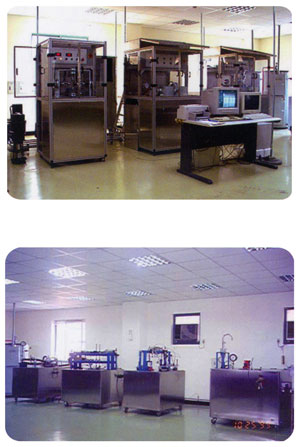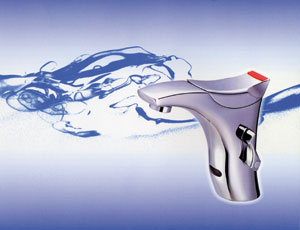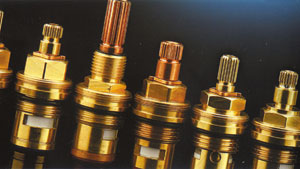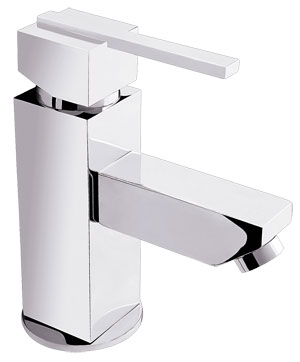New California Law Raises Cost for Taiwan's Plumbing Fixture Makers
2009/07/30 | By Ken LiuAround 300 plumbing-product manufacturers in Taiwan each year ship 80% of output to the United States, which wields ample clout as a major export destination, especially with the new California Assembly Bill 1953 (AB1953), to take effect on the first day of next year: mandating a ceiling of 0.25% of lead content in plumbing products carrying potable water in the Golden State, a market where Taiwan's plumbing product makers generate revenue approximately NT$5 billion (US$150 million at US$1:NT$33) a year.
In light of the new, tougher requirement, Taiwan's plumbing-product manufacturers are striving to improve manufacturing processes.
And to help the island's manufacturers meet the new benchmark, which other states have vowed to follow, the Taiwan government-backed Metal Industries Research & Development Center (MIRDC) has "won the license from the International Association of Plumbing and Mechanical Officials (IAPMO) last year to verify products to the AB1953 standards," says Chen Hung-yi, Assistant Chief of Technical Development & Test Service of MIRDC's Taichung branch, which is the exclusive IAMPO-approved verifier in Taiwan.
Chen says that the main difference between AB1953 and RoHS is that the former regulates chemical content in end products, while the later regulates chemicals added during manufacturing. "So AB1953 compels manufacturers to improve manufacturing processes to stay within strict specs in the end result," he says.

Although the MIRDC has assisted many Taiwanese manufacturers cross the new threshold, an overriding concern, Chen says, is the uncertainty over the amount of money to be invested in processing improvements. "Most makers do not mind the quantifiable investment, but it is the continual investment in facilities upgrading that truly worries them," Chen stresses, noting that new machine tools are required if chemical composition of materials is changed even minutely.
Currently, brass, an alloy of roughly 60% copper, 39.9% zinc and 0.5% lead, is the major material for making plumbing fixtures. Lead is added to facilitate mechanical processing.
"Lead-free brass is already available; but the only problem is costly production for it is expensive whether you add lead replacement or remove lead from recycled brass," Chen notes.
Reluctance to accept the expensive alloying of brass and complexity in process adjustment has driven the MIRDC to retool its lead-free brass program, using bismuth as the lead replacement since Bi does not interact with other chemicals and tends to mix with copper. However, Bi is costly.
The MIRDC has handled 10-plus applications related to AB1953 verification since becoming licensed to do so last year, according to Chen, which would total approximately 100 if including non-IAMPO cases. "The eco-friendly trend has raised the technical threshold of the plumbing industry and the MIRDC's role in helping domestic manufacturers overcome technical difficulties will become more significant in the foreseeable future," Chen notes.

Chang Yi Shin Industries Co., Ltd., reportedly a top-two contract supplier for U.S. faucet buyers, is an AB1953-qualified manufacturer. The firm's general manager, James Wang, says despite higher production costs due to AB1953, all manufacturers can compete on equal footing if everyone upgrades production to measure up to the new rule. "Even mainland Chinese manufacturers are keen to meet the standard, trying to shake off their negative stereotype," he notes.
Competition from China, Wang says, has become more intimidating to Taiwanese manufacturers year after year, prompting him to set up the program to organize the island's manufacturers to build a common brand to jointly develop international markets. "Brand name can enhance products with at least 5% added-value, so we organized eight manufacturers to attend the 2009 KBIS [Kitchen/Bath Industry Show in Atlanta, USA] under the group brand 'TAP,' which stands for Taiwan Aqua Professionals," he says.
Wang touts that the teamwork at the KBIS was a success from the record number of business cards received and buyers searching TAP suppliers from catalogs at the show.
Despite the existence of a plumbing industry association in Taiwan, with Chang Yi Shin Industries being a member, Wang feels that the association is not as effective as had been promised at the outset.
The TAP team has set up a counter at Chang Yi Shin Industries to sort and forward enquires to members.
The company has recently introduced several eco-friendly products, including one that recharges its batteries via running water. "This product has won quite a lot of orders from industrially advanced economies," Wang notes.
Chang Yi Shin Industries' effort to fend off intensifying competition from China has realized a modular faucet. "This item is less expensive for its construction is free of welds and fasteners. Besides, most of the components are of engineering plastic, hence toxic-free," he says. "You need to streamline manufacturing to cut cost to cope with competition from China," which the company has done by reducing manual labor as much as possible and by raising automation.
Chang Yi Shin Industries' faucets for pubic-work projects and households meet UL, UPC, CE, FCC and CSA in addition to AB1953 standards.

Having to meet AB1953 requirement has added 20% to Geann Industrial Co., Ltd.'s production costs, according to sales manager Fiona Wang. "Most of the increase is due to new material formula and new manufacturing processes, including machine tools," she says.
Founded in 1979, Geann Industrial specializes in contract manufacturing valves, including ceramic disc valve cartridges, lead-free cartridges, side body vales, rough-in valves, mixing cartridges, wall stop valves, and single lever cartridges for commercial and household plumbing. "We have the widest range of valves and certifications in Taiwan," Wang claims, including NSF, IAPMO, WRAS, ACS, KTW-DVGW, W270, Watermark, and CSA.
According to Wang, the company exceeds contract specs by supplying items guaranteed for one million operations when customers ask for only 500,000 operations. "Our quality almost equals that of German manufacturers," Wang says. But the company's pricing is around two-thirds to half those of German manufacturers. Other advantages for its good quality include the ceramic discs imported from Japan, and a patented pair of cushions protecting the discs from being cracked by excessively forcing valve levers.
Automation also contributes to the company's quality. Wang says her company is the first valve maker in Taiwan to use automated production. Using Japan-made CNC machining centers enables precision within a tolerance of 0.001 millimeter. "Quality can not be achieved simply by precision machines and components. Management also plays a major role. So we have set up systematic quality control, production and delivery," she stresses.

Axon Industry Co., Ltd., specializing in faucets for kitchens, bathrooms and drinking fountains, has met AB1953 standards by using a unique lead-free aluminum alloy instead of brass, according to the sales manager, Johnston Young.
"Although aluminum is less expensive than brass, very few manufacturers have ever used the material mostly due to technical difficulties, which we have overcome," Young claims.
Aluminum is rarely used to make faucets mostly because it oxidizes easily, making durable electroplating infeasible; but Axon has solved the problem by creating an aluminum alloy with magnesium and titanium.
The new alloy, Young says, has cost the company considerably in R&D, unable to quote precisely the increase in production cost however.
The upside is that the alloy, codenamed 2A12, has been approved by IAPMO to meet AB1953 standards.
Producing approximately 1,000,000 faucets a year, the company ships about 60% of output stateside, 95% of which fills contract orders.
Besides running a joint venture factory in Shandong Province, China capable of integrated production-from casting, polishing, machining, and chrome plating, assembly to water leakage testing-Axon, according to Young, also possesses sufficient equipment and know-how to develop new products and offer customers engineering consultation.




